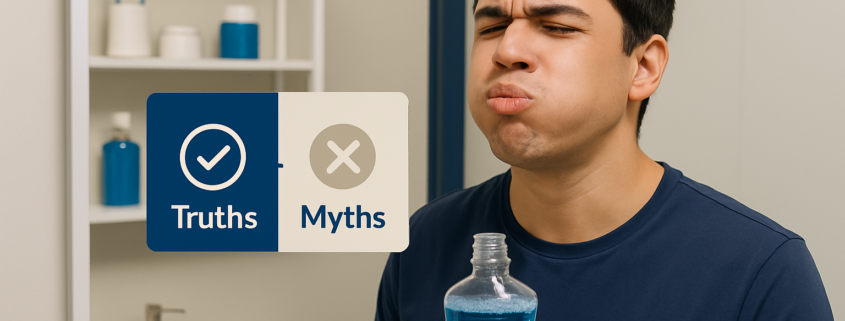Mouthwash Myths: What It Can and Can’t Do for Your Smile
A quick swish and you’re done—mouthwash gives you that minty-fresh feeling in seconds. But if you think that’s all it takes for great oral health, it’s time to rethink your routine. Mouthwash is a helpful tool, not a miracle cure. It’s also one of the most misunderstood products in the oral care aisle.
From believing it replaces brushing to thinking it can kill all bacteria, there’s a lot of misinformation swirling around the bottle. In this blog, we’re busting the most common mouthwash myths and clarifying what this rinse really brings to your dental game.
TLDR – Quick Guide
- Myth 1: Mouthwash replaces brushing—false.
- Myth 2: All mouthwashes do the same thing—nope.
- Myth 3: Alcohol-based rinses are better—not always.
- Myth 4: Mouthwash cures bad breath—only temporarily.
- The Truth: Mouthwash can support oral health, but it’s not a substitute for brushing, flossing, or regular dental visits.
Detailed Breakdown
Myth #1: Mouthwash Replaces Brushing and Flossing
Wrong. Mouthwash is not a shortcut for brushing and flossing. It doesn’t physically remove plaque or food particles like a toothbrush and floss do.
Fact: Mouthwash is a supporting player, not the star. It helps reduce bacteria and freshen breath but should be used afterbrushing and flossing, not instead of them.
Myth #2: All Mouthwashes Are the Same
Walk into any drugstore and you’ll see a wall of options. Antibacterial, fluoride, natural, alcohol-free… not all mouthwashes are created equal.
- Antibacterial rinses (like those with chlorhexidine or cetylpyridinium chloride) target plaque-causing bacteria.
- Fluoride rinses help strengthen enamel and prevent cavities.
- Cosmetic rinses focus mainly on breath freshening with little therapeutic value.
Fact: Choose a mouthwash based on your specific needs—gum health, cavity prevention, or breath control—not just the flavor.
Myth #3: Alcohol-Based Mouthwash Is More Effective
People often think the burning sensation from alcohol-based mouthwash means it’s “working.” But more burn doesn’t mean better results.
Fact: Alcohol is used as a preservative and antiseptic, but it can also dry out your mouth, making bad breath worse in the long run. Alcohol-free options are often just as effective and gentler on your tissues.
Myth #4: Mouthwash Cures Bad Breath
If you’re swishing to kill morning breath or cover up garlic from lunch, mouthwash can help temporarily. But if bad breath is constant, it might be a deeper issue.
Fact: Chronic bad breath, or halitosis, can be caused by gum disease, cavities, dry mouth, or even digestive issues. Mouthwash may mask the odor but won’t solve the root problem.
Myth #5: You Can’t Overuse Mouthwash
Yes, you can. Overusing strong, antibacterial mouthwash (especially those with alcohol) can disrupt your oral microbiome, drying out tissues and even irritating your cheeks and tongue.
Fact: Most dentists recommend using mouthwash once or twice a day—no more unless advised by your dentist.
When Mouthwash Helps (and When It Doesn’t)
Mouthwash Can Help With:
- Reducing plaque-causing bacteria
- Fighting early-stage gum disease (gingivitis)
- Freshening breath
- Delivering fluoride to strengthen enamel
- Post-surgical care (with prescription rinses)
Mouthwash Can’t:
- Replace brushing and flossing
- Cure gum disease
- Remove tartar or plaque
- Permanently eliminate bad breath
- Prevent cavities without other hygiene practices
Key Takeaways
- Mouthwash is a useful tool, not a total solution.
- It can reduce bacteria, deliver fluoride, and freshen breath—but it doesn’t clean your teeth.
- Not all mouthwashes are the same—choose based on your oral health needs.
- Alcohol-based formulas aren’t always better and may worsen dry mouth.
- Daily brushing, flossing, and dental visits still do the heavy lifting.
FAQs
Should I rinse with water after using mouthwash?
It depends. If you’re using fluoride mouthwash, don’t rinse—it washes away the fluoride. Check the label or ask your dentist.
Can kids use mouthwash?
Yes, but usually starting at age 6 and only under adult supervision. Choose alcohol-free versions made for children.
Is it better to use mouthwash before or after brushing?
Most dentists recommend using it after brushing and flossing to rinse away loosened debris and deliver active ingredients.
Can mouthwash prevent cavities?
Fluoride-containing mouthwash can help prevent cavities, but it won’t work alone—daily brushing and flossing are still essential.
Does mouthwash kill all the bacteria in your mouth?
No, and that’s a good thing. Your mouth needs healthy bacteria. Overusing strong antibacterial rinses can throw off this balance.




Leave a Reply
Want to join the discussion?Feel free to contribute!